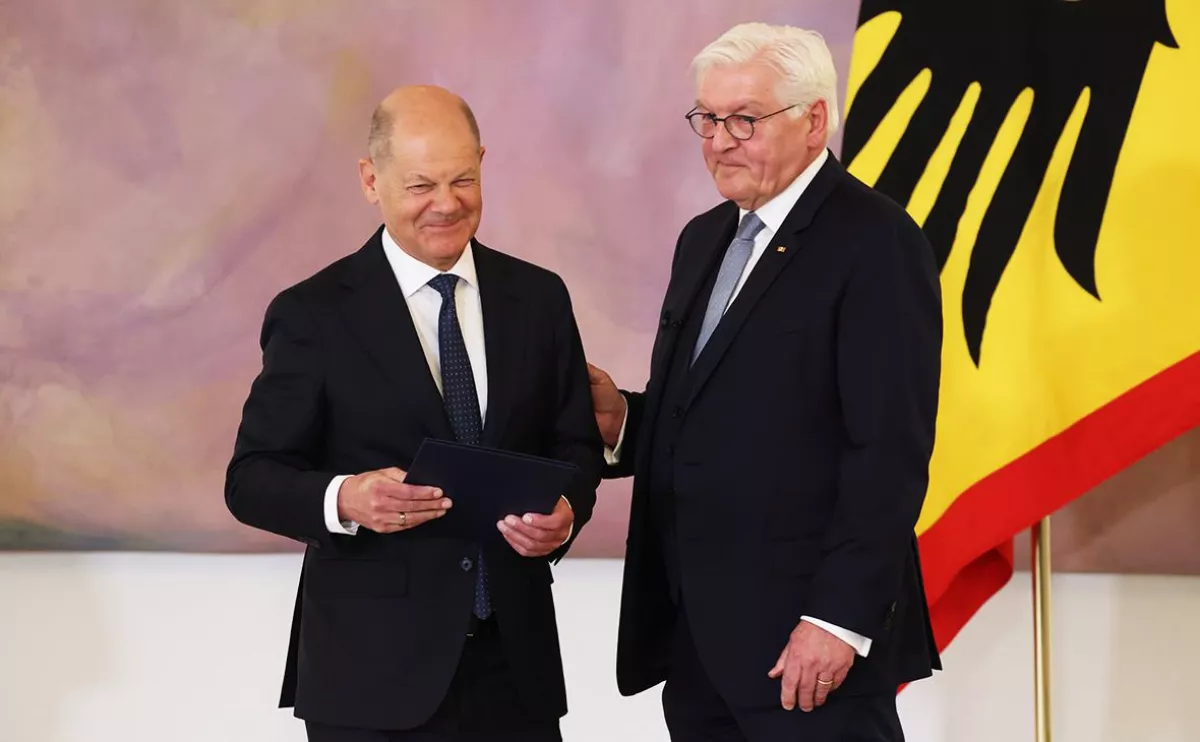Tetris froze: Misunderstanding as sign of German politics Diplomatic glitch or a deliberate signal?
As is well known, the visit of German President Frank-Walter Steinmeier to Armenia was accompanied by a diplomatic scandal, which has already been extensively covered by Azerbaijani media, including Caliber.Az. We will not go into detail again about what happened. We will simply reiterate briefly that the German president's administration posted a provocative Instagram post about the non-existent "Nagorno-Karabakh," embellishing it with the Tetris-like rag of the former Armenian separatists.
Not satisfied with the removal of the post and the German ambassador to Azerbaijan’s casual verbal apology, official Baku remained firm and demanded an official apology. The resolute stance of the Azerbaijani side had an effect, and on March 31, the German president’s administration sent a written apology to Hikmet Hajiyev, Assistant to the President of Azerbaijan and Head of the Foreign Policy Affairs Department of the Presidential Administration. "The post was published due to a technical mistake and bears no significance with regard to Germany's well-known position on the territorial integrity of Azerbaijan," the letter stated, among other things.

Was it really necessary?
Of course, everything can be written off as a misunderstanding. But the problem is that this misunderstanding is not accidental—it is systemic. One only needs to recall how, in March 2023, during Nikol Pashinyan’s visit to Germany, a "technical error" seemingly affected Chancellor Scholz’s speech apparatus. After all, the statements he made at a joint press conference with the Armenian prime minister regarding the "citizens of Nagorno-Karabakh" and "self-determination of nations" were later edited on the official website and even verbally disavowed by competent government representatives.
In general, if one follows Germany’s foreign policy, it has recently been one big misunderstanding. Perhaps its essence is best captured by a remark from the country’s Foreign Minister, Annalena Baerbock, who once stated that a certain "situation must turn 360 degrees." We understand that this was likely a slip of the tongue, but unfortunately, nothing describes German policy more accurately. It is a mere simulation of activity, the result of which is a complete spin in place.

Returning to the latest incident, it casts a huge shadow over German diplomacy, regardless of whether it was accidental or intentional. If it was indeed a mistake, then it means that the German president's administration employs incompetent people, which in itself is an alarming issue.
But if it was done deliberately, then… then let’s get to the bottom of it. In that case, it would mean that Berlin is expressing a hostile stance toward Azerbaijan. On what grounds, one wonders? For what reason? Because of the Armenians? Does this mean that, to paraphrase a classic, the Armenian question has corrupted the Germans?
Not exactly. In this case, the Armenians are not the cause but rather a consequence of the paradigm in which Germany has existed since its defeat in World War II. Ashamed of its Nazi legacy and positioning itself as one of the main pillars of the liberal camp, Germany considers it its sacred duty to pursue an ideologically driven foreign policy, supposedly in defense of the "oppressed and destitute"—a status that Armenians have long claimed for themselves.
Paradoxically, even in this, Germany has become the captain of misunderstandings.
Let’s set aside international law for a moment and focus on the issue of ideology—something particularly sensitive for Germany. I wonder, does the German leadership even realise that the entire "Karabakh movement" was thoroughly inspired by and steeped in the ideology of Tseghakronism—an Armenian version of Nazism? Its founder, Garegin Nzhdeh, found patronage under the Third Reich and even supplied soldiers to it.
Do they in Berlin understand that by waving around these Tetris-like blunders, they are in fact supporting an ultra-right Armenian nationalist project?

It's hard to believe they don’t understand this. So how do we explain it? Or perhaps Turkophobia and Islamophobia have united all forces across the European political spectrum—these phenomena, like a grave, equalise in their hatred socialists, liberals, Christian democrats, and far-right nationalists alike?
Yes, it is crucial to avoid romanticising German foreign policy. After all, we remember how, completely forgetting its "ideals" and bowing to the principle of realism, Germany joined NATO’s unjust act of aggression against Yugoslavia in 1999, enthusiastically bombing Belgrade. This serves as a reminder that Berlin is hardly in a position to present itself as a beacon of protection for the oppressed. As the saying goes, all moves are recorded, and if there are a few countries in the world with which cooperation would in no way tarnish Germany, one of them is Azerbaijan.
Instead of clumsily dancing to the rhythm of an Armenian round dance, dear German gentlemen and comrades, you would do better to stick to what you know best—take out your calculators and figure out where and with whom it is actually beneficial to cooperate.
It’s time to put an end to these misunderstandings.








